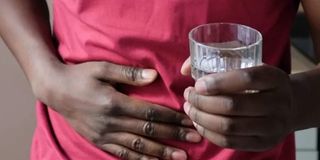Ask the Doctor: Do peptic ulcers have a permanent cure?

What you need to know:
- When mild, peptic ulcers may have no noticeable symptoms but if advanced, they may present with symptoms such as pain in the upper abdomen, nausea and vomiting, among others.
I have had recurrent ulcers for a while and even without any signs such as stomach pain, when my blood is checked, doctors diagnose ulcers. No treatment given has worked. What can I do? Ninsima
Dear Ninsima,
Peptic ulcers are sores that are found in the stomach inner lining and the first part of the intestines just after the stomach (duodenum). When mild, peptic ulcers may have no noticeable symptoms but if advanced, they may present with symptoms such as pain in the upper abdomen, nausea and vomiting, among others.
Most of these ulcers are caused by an infection caused by a bacteria referred to as Helicobacter pylori (H. while the rest are mostly as a result of overusing painkillers referred to as Non-Steroidal Anti-inflammatory Drugs (NSAID) such as aspirin, brufen and diclofenac.
Prevention and treatment of peptic ulcers requires lifestyle changes including, not taking NSAIDs, discontinuing smoking and alcohol consumption, avoiding foods and drinks that cause discomfort including caffeine, fatty or spicy foods as well as taking among other things, a lot of water to stay hydrated.
Drugs that reduce stomach acid production such as omeprazole, those that kill Pylori such as clarithromycin and flagyl can also be taken coupled with lifestyle changes to treat the germ if present.
Unfortunately, nowadays, the germ has become resistant to clarithromycin and flagyl, requiring the use of other drugs instead. The drugs to be given may be determined by growing the germ and subjecting it to various medicines with the most effective one at killing the germ being used as treatment (culture and sensitivity).
Your kind of question shows that you are most likely self-prescribing drugs instead of seeing a doctor for treatment and advice.
Once you start taking drugs to kill the said bacteria, you must test again four weeks after stopping the treatment, or two weeks after discontinuing drugs that reduce stomach acid.
If you check for the germ earlier than the said two or four weeks, you are likely to get wrong results including those indicating you still have the germ whereas not. Also, the blood test is likely to remain positive for a long time after the treatment (even when the germ was eradicated), requiring either using stool, breath or biopsy tests after treatment to kill the germ.
Please visit your doctor again for review since you may require undergoing other tests such as an endoscopy or a referral to a specialist.
What is the root cause of teeth grinding?
My wife grinds her teeth at night which greatly affects the quality of my sleep. I have also recently noticed that our daughter also grinds her teeth. Is it hereditary? Samson
Dear Samson,
It is true that teeth grinding at night, much as it may happen mostly in children who may later outgrow it, may happen in a few adults as well.
Some of these adults may not have outgrown the problem while others may have outgrown it but may have restarted tooth grinding due to other factors including stress, smoking, drinking too much alcohol, abusing substances such as cannabis, cocaine, and caffeine. Other factors include taking drugs for depression such as fluoxetine and having sleep problems, among others.
It is true that each one of us may occasionally grind, gnash or clench teeth during the day or at night during sleep when we are unaware except when told by a sleeping partner. It is also true that teeth grinding may be hereditary.
Tooth grinding not only disturbs the partner's sleep it also leads to hypersensitive teeth, aching jaw muscles, headaches, tooth wear, damage to dental restorations (such as crowns and fillings) and damage to teeth requiring that it is stopped.
If stress is the cause, your daughter may require counselling and other ways of managing stress such as an exercise programme and having better sleep hygiene. Meanwhile, she should avoid taking, among others, caffeine containing beverages such as sodas, coffee or energy drinks in the evening.




